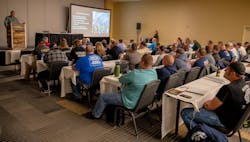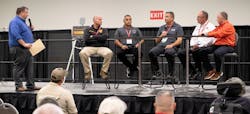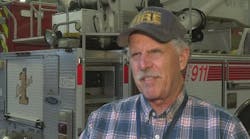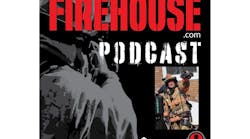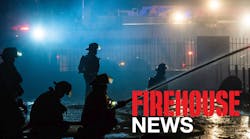In June of 2022, I had the privilege of presenting my class, “A New Chiefs Guide to Surviving Local Politics,” at the New York State Association of Fire Chiefs annual training conference. Just before the class started, I was speaking with some of the attendees, prepping my PowerPoint and scanning the room to do a head count. As I looked around the conference room, I saw Dr. Denis Onieal sitting toward the back.
At first, I was a bit shocked, asking myself why this fire service legend was sitting in my class. It wasn’t until after the class concluded that I had the chance to speak with him and learn why he was there—but, more importantly, as it turned out, why I was there.
Onieal provided me with feedback as well as spoke about the societal relevance of my topic. He then said something that still resonates with me and serves as the basis of this article: “You are picking up the torch from Hal Bruno.”
Knowing the effect that Bruno had and continues to have on the fire service, I took this as quite the compliment. However, Onieal’s remark also caused me to recognize how important it is that we continue to share our knowledge, give back to the fire service and “pass the torch” to others. This requires that you focus on how you can take your own skills, thoughts and fire service beliefs and disseminate the information both near and far.
Below you hopefully will find inspiration on how to take your service to the next level. Also presented are examples of people who once were in your shoes and now deliver their own impactful fire service message.
Niche
Finding a topic, or your niche, requires you to identify something that you’re passionate about. We all know those instructors who can teach the whole catalog of classes, but when they present thyey are monotone and dry. They teach from the slides and appear to be uninterested. You can’t get others to be excited about a topic if you as the instructor aren’t excited about it.
Your niche should reflect what you are doing and dealing with at your department regularly as well as what you have seen and done during your career. This merges both education and experience, which provides a unique first-person perspective and makes you well rounded with your topic.
After you identify your niche, you can start to build your program: lesson plan development, skill stations, PowerPoint, handouts, etc. Even if you get frustrated, keep the passion and excitement, knowing that what you will contribute will leave the fire service better than you found it—just like Marc Aloan will when he presents “The Hat Dance: Realities of the Short-Staffed Company Officer” at Firehouse Expo in Columbus, OH, this year, and like Rich Driscoll and Jay Dixon did in “Kids These Days: How to Win Friends and Influence Firefighters,” and like Tony Correia did in “How the Grateful Dead’s Business Practices Improved Organizational Performance.”Know that even if you write and develop your own program, some grooming and assistance might be needed in regard to how you can be an effective fire service instructor. A great way to get this assistance is from the formal education side, such as taking a Fire Instructor class or other classes that emphasize and focus on public speaking and writing.
Putting these skills to work on material that was verified and historically accepted by the fire service is another great way for you to grow. By becoming an instructor at a county training facility, community college or fire college or for a state agency surely will get you experience. This also will provide the opportunity to be vetted by peers and superiors, which will help you to flourish as an instructor.
First delivery
We all know that the harshest but most truthful criticism often comes from our sisters and brothers in the firehouse, so who better to test your new program on but them.
Take the time to deliver the program while on shift, starting with your company then expanding to other companies on your shift and then to other shifts.
Don’t get discouraged if the first reviews aren’t glowing and the accolades aren’t what you anticipated. What these folks will tell you is out of love and wanting you to succeed with this venture just as much as you do. They might even provide additional content or subject expertise on what you discuss, which should be incorporated into your program, because you won’t remember every aspect and fine detail.
Keep presenting to these groups as you continue to refine and update, because these repetitions will make you more comfortable with the material and with speaking in front of others.
Everyone reaches goals and milestones at a different pace. Those who are around you daily will let you know and/or confirm your own intentions on when it’s time to move to the next step. That step will be to broaden your audience and increase the amount of people who will hear your message and become better firefighters because of it—just as with the case of Jacob Johnson’s upcoming Firehouse Expo class, “Mentoring: Founded on Failure and Fueled by Regret,” Aaron Heller’s “Preparing for the Commercial Fireground” and Justin Bailey’s “The Rural Challenge: The First 10 Minutes.”
Putting yourself out there
By this point in the scheme of things, you fine-tuned your program and practiced presenting it. You’re ready to move on to delivering your message to a larger, more expansive fire service audience.
You might be content to stay local or regional, or you might aspire to travel farther from home. If the latter is the case, a quick internet search or perusing social media will turn up a number of small, medium and large conferences that often solicit calls for presentations.
Work on an outline that incorporates a program description, learning objectives, your relevance as an instructor, instructor biography and delivery method. It should be easy to copy and paste.
Of course, you might get denied the first couple of times, but persistence and patience will pay off.
When the opportunity presents itself, take full advantage of what’s offered, such as taking other classes, networking with instructors, asking attendees of your class what they thought of it, and applying end-of-class evaluations and surveys.
You will be afforded opportunities to interact with other instructors, some of whom might be those who you have looked up to and/or who inspired you to take this step in your career.
For those who will follow
Passing the torch carries with it a substantial responsibility, and it’s your chance to give back to a fire service that has given you so much and to make it better for the next generation, just as Robert Moran and John J. Lewis will do when they present “Basement Fire Operations: The Dangers Lurking Below” at Firehouse Expo; just as Leigh Shapiro prepares the next generation of fire officers in “Critical Thinking for Fire Officer Development”; and just as Andrew Roach increases the knowledge base of chief officers through “The Importance of the 360 Size-up.”
So, remember, pass on the torch—and do it before the flame goes out!
